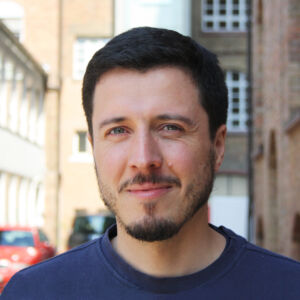

Research
Knowledge for transformations towards sustainability
Our research is rooted in Social Ecology, a field of science co-founded by ISOE scientists and known for its transdisciplinary approach.
Social Ecology explores the interactions between humans, society, and nature, focusing on ways to make these relationships more sustainable. Understanding and shaping are inseparably linked in this transformation-oriented science. Only by actively shaping and implementing alternatives can we uncover their transformative potential. By systematically connecting empirical research within our fields with theoretical work, we ensure that our research is both scientifically robust and practically relevant.

Lisa Zimmernmann, research associate in the PlastX research group, examining plastic extracts and migrates using cell tests.
We conduct inter- and transdisciplinary research
ISOE scientists are among the pioneers of transdisciplinary sustainability research. Our core expertise lies in inter- and transdisciplinary research methods and designs.
We specialize in integrating approaches from the social sciences, natural sciences, technical sciences, and humanities. Through joint learning processes with societal actors, we combine diverse perspectives, problem perceptions, and practical knowledge with scientific questions and insights. To foster this integration and the co-production of new, critically validated knowledge, we continuously advance suitable transdisciplinary methods and concepts.
In doing so, we focus on conceptual and theoretical foundations, empirical case studies, and science policy issues with the aim of ensuring the quality and effectiveness of transdisciplinary research and strengthening its societal relevance. The professorship in “Social Ecology and Transdisciplinarity” at Goethe University Frankfurt also contributes to these efforts.
The transdisciplinary approach is indispensable to adequately address, critically analyze, and develop effective strategies for the complex social-ecological challenges and transformation pathways of our time. Through this research mode, we gain a more comprehensive understanding of interconnections, causes, effects, and options for action. Additionally, we design new future perspectives and develop innovative alternatives for action that are tailored to the needs of those affected. The insights gained support both societal transformation processes and scientific progress.
In addition to their extensive expertise in transdisciplinary research, our scientists possess a wide range of disciplinary methodological competencies. Depending on their academic background, they are skilled in qualitative and quantitative empirical social research, integrated modeling, multi-criteria sustainability assessment, forecasting, and scenario development.
Our Research Methods at a Glance
-
Empirical Social Research
When developing measures and approaches for transformations towards sustainability, it is important to know and understand people’s perspectives.
-
Modeling
To understand the effects of actions and the complex system interrelations of sustainable development, we create integrated models of the various influencing factors.
-
Scenarios and Forecasts
In order to be able to make statements on the factors that are influencing coming developments, we use the scenario technique to establish reliable assumptions about the future.
-
Evaluation and Impact Assessment
We conduct evaluations to gain insights into the effectiveness, success factors, relevance and acceptance of measures, interventions and offers.
-
Integrated Assessment
As part of evaluations and impact assessments, integrated assessment methods are a crucial element in evaluating innovations and measures in terms of their sustainability and their contribution to socio-ecological transformations.
-
Stakeholder Processes
General change processes as well as the impact of individual measures, depend on the interests and actions of various stakeholders, but in turn also have an impact on them. It is therefore crucial to involve the relevant actors in the research process from an early stage and thus enable a joint knowledge production.
-
Real-world Laboratories
We use the transdisciplinary research approach of real-world laboratories to generate knowledge on how to shape social transformations towards greater sustainability and how to initiate them.
Contact Research Methods


In the project “PendelLabor – Pathways to Sustainable Urban-Regional Mobility Using the Example of the Frankfurt Rhine-Main Region”, an interdisciplinary team of researchers and practitioners explored how commuting can be made more sustainable and aligned with the mobility transition. The images were created by participants of the commuting experiment.
Responsible Handling of Research Data
Research data is a fundamental basis for generating new scientific knowledge. At ISOE, we place great emphasis on the responsible and scientifically sound handling of research data.
Our research data management ensures that data is processed, secured, archived, and made available over the long term in accordance with recognized standards. This approach aims to promote transparency, reproducibility, and reusability of results, thereby ensuring good scientific practice. We take into account the specific requirements of each scientific discipline.
Our research data management is guided by the FAIR principles: data should be Findable, Accessible, Interoperable, and Reusable. Additionally, ISOE strives to make data available without access restrictions (Open Access) whenever possible.
Research Data Policy
-
Guideline for the management, storage, archiving and publication of research data
Contact Research Data Management
Dr. Florian Schneider

Integrity and Ethics in Our Research
The Ethics Committee supports ISOE researchers in upholding ethical standards during their empirical research. The committee operates in accordance with the recommendations of the German Data Forum (RatSWD).
Its members bring extensive expertise in the social, natural, and engineering sciences. Alongside internal and external scientists, ISOE's data protection officer is also part of the committee. As an independent advisory body, the Ethics Committee members are not subject to directives and act solely according to their conscience.
ISOE’s Ethics Committee is a member of the NEKS – Network of Ethics Committees in Social Research. The committee is represented in this network by its chair, Dr. Thomas Friedrich.
Members
Dr. Thomas Friedrich (chair)
ISOE, Research Units Sustainable Society, Biodiversity and People
Petra Hansen
ISOE, Data protection
Dr. Katja Brinkmann
ISOE, Research Unit Water and Land Use
Dr. Georg Sunderer
Zahlengrün, external member
Dr. Martina Winker
ISOE, Member of the Executive Board
Prof. Dr. Dennis Eversberg
Goethe University Frankfurt, external member
Stefanie Burkhart
ISOE, Research Units Transdisciplinarity, Biodiversity and People
Dr. Miriam Schad
ISOE, Research Unit Sustainable Society
Dženeta Hodžić
ISOE, Research Units Transdisciplinarity, Water and Land Use
Contact Ethics Committee
